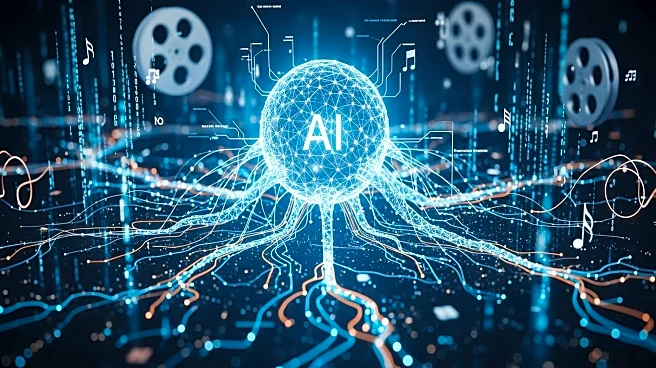What's Happening?
Mike Ovitz, a prominent figure in Hollywood, has launched Sound Patrol, a research lab focused on combating intellectual property theft using artificial intelligence. Ovitz, who co-founded Creative Artists Agency and served as its chairman for 20 years,
has shifted his focus to technology investments in Silicon Valley. Sound Patrol utilizes neural fingerprinting technology to detect piracy, forgery, and copyright infringement in music, with plans to expand to other media forms. The initiative has garnered support from major music labels like Universal Music and Sony, allowing them to deploy the technology to monitor and address unlicensed activity in real-time.
Why It's Important?
The launch of Sound Patrol represents a significant advancement in the fight against IP theft, a longstanding issue in the entertainment industry. By leveraging AI, Ovitz aims to provide a robust solution that can identify manipulated audio and AI-generated tracks, potentially saving the industry billions lost to piracy. The technology's ability to trace content back to its source could also have broader implications for combating misinformation and deepfakes in political advertising and social media. This initiative highlights the growing intersection of technology and entertainment, with AI playing a crucial role in safeguarding intellectual property.
What's Next?
Sound Patrol plans to expand its neural fingerprinting technology beyond music to include video and sports content protection. The company operates on a subscription-based model, with major labels paying for access to its monitoring technology. Ovitz envisions a public-private partnership to further enhance the capabilities of Sound Patrol, emphasizing the need for collaboration between the private technology sector and government to address IP theft and misinformation. As the technology evolves, it could become a critical tool in maintaining the integrity of digital content across various platforms.
Beyond the Headlines
The implications of Sound Patrol's technology extend beyond the entertainment industry, potentially impacting public policy and societal norms. By distinguishing real from fake content, the initiative could play a role in preserving democracy and public health, addressing issues like fraudulent medical claims and synthetic content designed to deceive. Ovitz's approach underscores the ethical and legal dimensions of AI in content protection, advocating for regulation and licensing agreements to ensure legitimate use of technology.
















